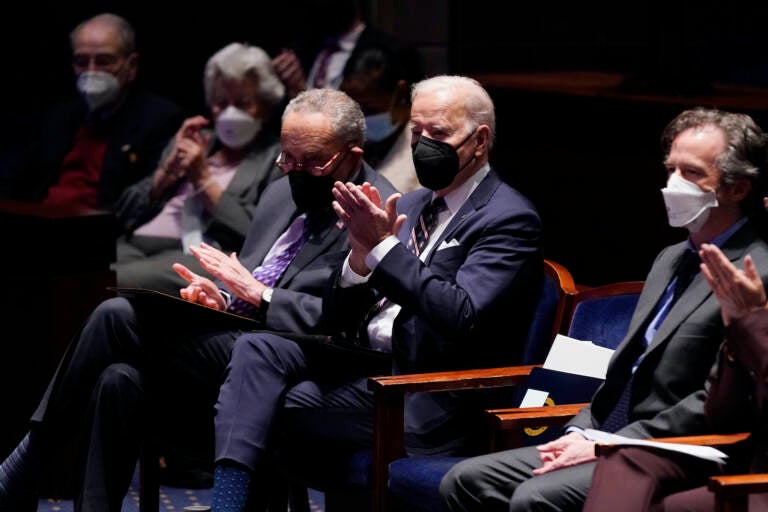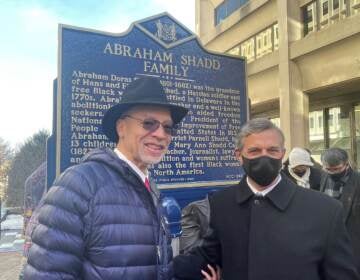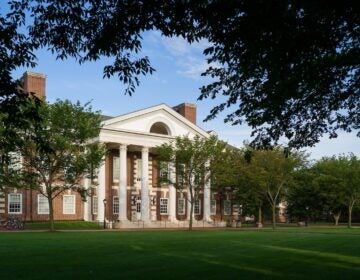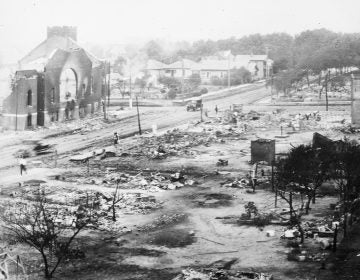Delaware’s Bryan Stevenson calls for racial justice at National Prayer Breakfast
Racial justice took center stage at this year’s National Prayer Breakfast, led by keynote speaker Bryan Stevenson, who leads the Equal Justice Initiative in Alabama.

President Joe Biden attends the National Prayer Breakfast, Thursday, Feb. 3, 2022, on Capitol Hill in Washington, with Senate Majority Leader Chuck Schumer of N.Y. to his left. (AP Photo/Patrick Semansky)
Growing up in southern Delaware in the 1960s, Bryan Stevenson experienced segregation and racial injustice first-hand.
His great grandparents were enslaved in Virginia, and he grew up hearing stories of their trauma. He attended a segregated school in Milton in his early years.
On Thursday morning, Stevenson shared those experiences to issue a call for justice before Congressional leaders gathered along with President Joe Biden for the National Prayer Breakfast. He said there are narratives in America that contaminate the efforts to establish true racial justice.
“We are also the heirs in this country of a horrific history of racial injustice,” he said. “We are still burdened by the consequences of bad choices, mistakes that were made. And it doesn’t matter where you live, you live in a space where you can still see these pollutants in the air.”
While some might suggest the “pollutants” of racial hatred in the past would dissipate on their own, Stevenson told the crowd he doesn’t believe that. “I think we’re going to actually have to talk about things that we haven’t talked about before.”
His comments come as lawmakers around the country consider legislation that would more strictly regulate what teachers may include in lessons about slavery in the classroom. That includes action in Oklahoma that would prohibit schools from teaching that one race is the “unique oppressor” or “victim” when talking about slavery in America.
He said true justice will fight against the narrative of hate and bigotry, pointing to the awful conditions his ancestors experienced.
“I’m the child of fore-parents who were abducted, kidnapped, trafficked to this country in chains,” he said. He described his great grandparents who were enslaved in Caroline County, Virginia, and “forced to labor on plantation fields from the time they were small children until they were teenagers. They were denied freedom. They were denied dignity.”
He said that denied dignity carried on even after the Civil War, leading to lynchings and lawlessness against Black residents in the South. It also led to growth in cities like Detroit, Chicago, Los Angeles, and New York, not because Black workers were looking for economic opportunity, but because they were “refugees and exiles from terror in the American South.”
And despite the efforts of civil rights leaders and changes in laws, that narrative of racial hatred remains.
“It breaks my heart that today we still live in too many places where there are these presumptions of dangerousness and guilt that get assigned to people because of their color,” he said. It doesn’t matter whether you’re a member of Congress or just a regular citizen, “You can go places where you’re going to be presumed dangerous and guilty. And I can tell you as I’m getting older that when you have to constantly navigate these presumptions, you get tired.”
Stevenson has led the effort to honor thousands of Black residents lynched in the South from 1877 to 1950 with the National Memorial for Peace and Justice in Montgomery, Alabama. He’s also argued that the history of racial violence has carried over into courtrooms, resulting in a higher rate of death sentences for Black people convicted of crimes.
To really find justice, it’s necessary to get close to those experiencing injustice, Stevenson said.
“We cannot do justice if we are unwilling to go to the places where cruelty and oppression are manifest, where abuse of power is manifest, where suffering is manifest,” he said. “It’s in proximity to those who are excluded and neglected, those who are suffering that we begin to hear things that we won’t otherwise hear. We see things that we won’t otherwise see.”
He encouraged congressional leaders to get close to those who are hurting.
“I’m the product of someone’s choice to get proximate. I grew up in a community where Black children could not attend the public schools. I’m here because lawyers made the uncommon choice to get proximate to poor Black kids like me,” he said. “These lawyers came into our community. They enforced the Supreme Court’s decision in Brown vs. Board of Education, and because of that, I got to go to the high school. I got to go to college. I went to law school.”
He also urged Congress to find a way to demonstrate unity that could be an example for the rest of the nation.
“When you model fellowship in this Congress, when you embrace one another in this Congress, when you actually talk about our common humanity, our shared humanity, there will be those who criticize, there will be those who say you’re not supposed to do that and there will be pushback,” he said. “But I am persuaded that great things only come when great people are willing to embrace one another to do the uncomfortable.”
U.S. Sen. Chris Coons of Delaware, who has long been involved in organizing the prayer event, introduced Stevenson by quoting the keynote speaker: “Our nation’s history of racial injustice casts a shadow that can’t be lifted until we shine the light of truth on the destructive violence that shaped our nation, that traumatized people of color and compromised our commitment to the rule of law and to equal justice for all of us,” Coons said.
As the founder of the Equal Justice Initiative in Alabama, Stevenson has made a name for himself as an advocate for those wrongly convicted. He wrote about his experiences in a memoir called “Just Mercy: A Story of Justice and Redemption,” which was turned into a feature film in 2019.

Get daily updates from WHYY News!
WHYY is your source for fact-based, in-depth journalism and information. As a nonprofit organization, we rely on financial support from readers like you. Please give today.







